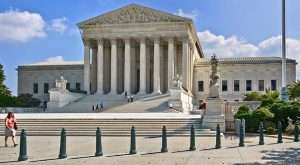The Volokh Conspiracy
Mostly law professors | Sometimes contrarian | Often libertarian | Always independent
My New Article on "Rethinking the Supreme Court's Impact on Federalism and Centralization"
The article challenges longstanding conventional wisdom. It is coauthored with political scientist Michael Dichio (University of Utah).

For decades, conventional wisdom has held that the Supreme Court is, on net, a force for centralization in the American political system. A new article I coauthored with political scientist Michael Dichio challenges that conventional wisdom. Our initial draft is now available for free downloading on SSRN. Here is the abstract:
This article examines the U.S. Supreme Court's impact on centralizing and decentralizing power in the American federal system. Through an original database of nearly 700 landmark constitutional decisions, we show that the Court has contributed to the centralization of political power, defined in the traditional sense of expanding federal government authority relative to that of states and localities. But it has also promoted decentralization by protecting individual rights against state and local governments. The impact of the Court also tends much more toward decentralization if we classify decisions upholding federal laws against challenge, as neutral, rather than centralizing. These two crucial methodological points have been largely neglected in previous analyses of the Court's impact on federalism and centralization. There are, in many situations, good reasons to adopt them. We also present multiple models for understanding how the Court affects federalism.
Our analysis calls into question the traditional picture of the Court as a consistent force for centralization. It also raises serious questions about the conventional wisdom on the impact of the Court on centralization during specific periods in American history.
This article grew out of my review, in Publius: The Journal of Federalism, of Michael Dichio's excellent 2018 book, The US Supreme Court and the Centralization of Federal Authority. In the review, I suggested these two methodological changes. Michael reached out to me to see if we could do an article about them, and now we have done so! The article includes a detailed defense of those moves, and also includes a number of other innovations.
We don't completely reverse the traditional conventional wisdom about the Court and centralization. But we do explain why it requires substantial modification, amounting to reversal with respect to a number of key issues.
This an early draft, and we look forward to modifying it in response to comments, questions, and criticisms.
Editor's Note: We invite comments and request that they be civil and on-topic. We do not moderate or assume any responsibility for comments, which are owned by the readers who post them. Comments do not represent the views of Reason.com or Reason Foundation. We reserve the right to delete any comment for any reason at any time. Comments may only be edited within 5 minutes of posting. Report abuses.
Please to post comments


I'd say that they have not been half the force opposing centralization that they would have been if they'd been faithful to the Constitution, but I don't think they've been an active force in favor of it.
Just an entirely inadequate defender against it.
The Fourteenth Amendment does not enact Mr. Brett Bellmore's Articles of Confederation.
Nah, that would be the 10th amendment.
"But it has also promoted decentralization by protecting individual rights against state and local governments."
That's not decentralization. That's especially not decentralization if the individual right was "granted" by the federal government. The power (in this case the right being granted) is coming from the federal government, and is a centralizing influence.
My reaction is similar. I do not see value in 44 pages of hair-splitting on the meaning of "centralization". It is not a legally important concept like "Congress shall make no law".
Let's add on another point here.
You've got 4(5) categories
1. Striking down state or local laws. (Centralization)
2. Upholding state or local laws (Decentralization)
3. Striking down federal laws. (Decentralization)
4. Upholding federal laws. (Centralization)
5. "Neutral".
You propose taking a single one of these categories "Upholding federal laws" and changing this from Centralization to Neutral. If you do this, logically you should also change "upholding state/local laws" to neutral. By not doing so, it just tilts the balance unevenly
The Supreme Court has actually had the effect of "decentralization" if you accept our definition of "decentralization".
I do not accept the premise that when the Court strikes down a state or local law to "protect individual rights", it has effected "decentralization".
For example, intuitively, would the average person feel that Roe v. Wade and its progeny, which have struck down state restrictions on abortion, had a "centralizing" or "decentralizing" effect?
You were fortunate today, Prof. Somin -- you were not the right-wing Ilya who had to tuck his tail between his legs for being a bigot in public.
If you can say that a federal rule resolving otherwise an local policy conflict in a single way is “decentralizing” if it resolves it the way Professor Somin would prefer, why can’t people with different policy objectives also label a federal rule that resolves things their way “decentralizing”?
After all, “decentralize” is a nice-sounding word, like “fresh,” natural,” etc. Why leave nice-sounding words with definite meanings if we can co-opt them into promoting what we think best?
Is this really any different from, for example, Trump suporters designating an election as “fair” if the pro-Trump candidate wins? “Fair” is also a nice-sounding word. Why leave it with a definite meaning?
Why are lawyers infatuated with the word "impact"? Are affect/effect not impactful enough?